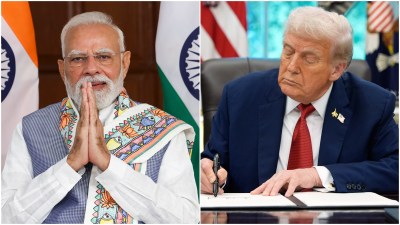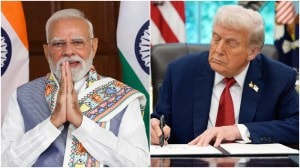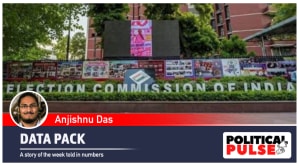Banatwala is missed, at the Parliament library
His peers would pay him rich tributes and his supporters would recall the contribution he made to the cause of the Indian Muslim...

His peers would pay him rich tributes and his supporters would recall the contribution he made to the cause of the Indian Muslim, but a small set of people at the Parliament House mourn Ghulam Mohammad Banatwala in silence for a special reason. These men and women do not care what ideology Banatwala subscribed to, but they are all sad that a diligent parliamentarian is no more.
“Every day of a session he would walk in to the Parliament House Library and get down to what interested him the most — reading,” recalls Saroj Bala, formerly in-charge of the library. Clad in his trademark sherwani and topi, Banatwala would settle down in one of the two reading rooms meant for MPs in the main building — the new spacious building named after the late G M Balayogi had not come up by then. “If he was not inside the House, Banatawala would be busy reading some book or taking down notes,” says Bala, who works for Lok Sabha TV after her retirement.
He was among the few MPs who would suggest additions to the library. “Fiction was not his cup of tea — but every time a good book dealing with any political, legal, constitutional or social issue would be released, I knew Banatwalaji would be the first to ask me if we have got it,” says Saroj.
“It was an extremely pleasant feeling providing him with one for he was among those who know the worth of the printed word.”
“Do you know, he drafted his own questions?,” asks a middle-rung member of the Lok Sabha staff, a telling comment on the present state of affairs. “Once he would be seized of any single matter, he would seek whatever book or reference material we would have on it,” says a library employee who shared a special bonding with the MP for they would talk in Marathi. This bonding was quite something, considering the seven-term MP could not speak Malyalam, the language which his electorate spoke.
Another House official says the IUML leader was a “one-man show”, who had mastered the rules of business so well that he was able to speak every day in the House. It could be a question, a special mention, a calling attention, a Bill or a discussion — Banatwala was there holding forth.
Banatwala’s track record in the 13th Lok Sabha highlights this very point: a total of 25 private members’ bills — on issues ranging from the right to work and freedom of religious conversion to custodial deaths and protection of farmers — 141 starred and unstarred questions and 182 interventions during debates.
“It is a pity that his party did not nominate him during the last Lok Sabha polls,” says another library employee, though with no political reason. “We all felt he would have made use of the enormous facilities we have put in place in the new library building.” Furniture, ambience, lighting and the best books, the place has just about everything going for itself, except for readers.
Man of the league
• Born in Kutch, Gujarat, Ghulam Mohd Banatwala migrated to Mumbai and worked as a college lecturer
• His political life began when he met Peer Muhammed, son-in-law of Muhammad Ali Jinnah. Later, he was elected president of the Mumbai Muslim League, headed by Peer Muhammed.
• Banatwala was closely associated with the late IUML leader and former Kerala chief minister C H Muhammed Koya. Banatwala entered electoral politics in Kerala in 1977, when he first won Ponnani constituency in Malappuram. He won the seat seven times, though he never actively campaigned in the area.
• As MP, Banatwala would be remembered for the Shariat Bill which he presented in the Lok Sabha in 1986. The then Central Government adopted this Bill as the Muslim Women Protection of Rights on Divorce Act.
• He was sidelined in the party after his friend Ibrahim Sulaiman Sait formed the Indian National League




- 01
- 02
- 03
- 04
- 05


























